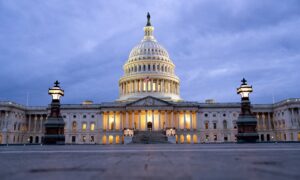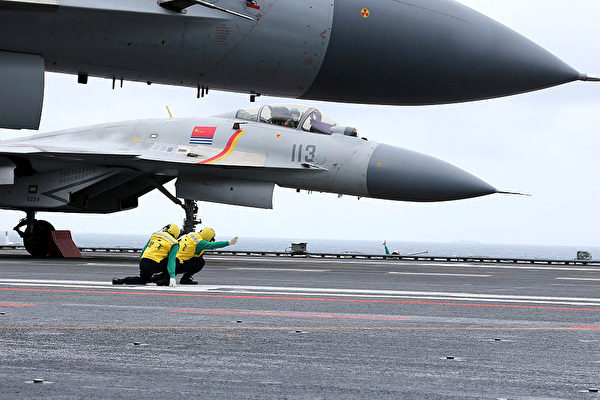A Pro-China Think Tank Operating in Washington—Should We Be Concerned?
CommentaryThink tanks are like bacteria; they’re everywhere. The United States, home to the largest number of think tanks in the world, has 1,984 of them. Of course, not all think tanks are created equally; some are better than others. But every single think tank is designed to promote a very specific set of values or ideas. This begs the question: Why is there a pro-China think tank operating in Washington? Of the nearly 2,000 think tanks in the United States, 400 are based in Washington. One of them happens to be the Institute for China-America Studies (ICAS). The supposedly independent institute receives most of its funding from the Hainan Freeport Research Foundation in China. The purpose of this specific foundation, we’re told, “is to commit to the scientific development of the South China Sea resources, build national and local governments in the South China Sea,” and inform “media, NGO, conflict prevention, and resolution mechanisms.” In other words, the foundation is designed to legitimatize Beijing’s unlawful maritime claims. The Hainan Freeport Research Foundation is backed by the National Institute for South China Sea Studies, a CCP-affiliated research center that echoes Beijing’s claims to the disputed territory. Not surprisingly, ICAS also supports the Chinese Communist Party’s (CCP) contentious position in the arm of the western Pacific Ocean. The importance of the South China Sea, a critical maritime crossroads for trade, cannot be emphasized enough. Right now, it’s arguably the most important economic region in the world, accounting for one-third of the world’s maritime trade. As I write this, the Chinese are holding combat drills in the South China Sea. As the geopolitical guru Robert D. Kaplan previously warned, the battle for the South China Sea could prove to be “the defining battle of the 21st century.” Chinese J-15 fighter jets on the deck of the Liaoning aircraft carrier during military drills in the South China Sea on Jan. 2, 2017. (STR/AFP via Getty Images) For the best part of a decade, the CCP has continued to lay claim to much of the South China Sea. Not surprisingly, such claims have irritated other neighboring claimants, including Brunei, Indonesia, Malaysia, the Philippines, Vietnam, and Taiwan. Why is Beijing so interested in the South China Sea? Besides being an important conduit for maritime trade, the South China Sea contains billions of barrels of oil and trillions of cubic feet of natural gas. China is bullying other countries in the region, and there’s a think tank in Washington championing its cause. As tensions between the United States and China escalate, can the former really afford to have a CCP-backed think tank operating in the country’s capital? After all, there are plenty of reasons to believe that the CCP uses think tanks to conduct espionage. Earlier this year, FBI Director Christopher Wray said the espionage threat from China was “more brazen” than ever before. Moreover, Beijing is desperately attempting to create think tanks with “Chinese characteristics,” institutes that wield “major global influence.” China is actively attempting to infiltrate influential Western institutions, all in the hope of controlling the overarching narrative. In a recent piece for The Federalist, I outlined the many ways in which China has infiltrated the United States, supposedly the most powerful country in the world. But a true superpower would never allow itself to be subverted in such a blatant manner. This brings us back to ICAS. Think tanks don’t just influence public policy; they influence the minds of the masses. The policies and ideas that emanate from think tanks are, more often than not, biased. Let’s be clear here: there happens to be a Chinese think tank operating behind enemy lines, promoting ideas and values that oppose those held by the United States. As the author Nadeem Yaqub noted last year, think tanks develop their perspectives and policies “through the prism of political bias,” so “knowing who’s paying for those ideas is important.” Indeed. With ICAS, we have a good idea of who’s paying—the CCP. The idea of a Washington-backed think tank operating in Beijing sounds preposterous. That’s because it is. The CCP would never allow it. Why, then, is the United States so accommodating to China? Why has the United States allowed a think tank affiliated with the CCP to set up shop in Washington? There is a fine line between cordiality and recklessness. U.S. policymakers would do well to remember this. Views expressed in this article are the opinions of the author and do not necessarily reflect the views of The Epoch Times. Follow John Mac Ghlionn is a researcher and essayist. His work has been published by the New York Post, The Sydney Morning Herald, Newsweek, National Review, and The Spectator US, among others. He covers psychology and social relations, and has a keen interest in social dysfunction and media manipulatio

Commentary
Think tanks are like bacteria; they’re everywhere. The United States, home to the largest number of think tanks in the world, has 1,984 of them. Of course, not all think tanks are created equally; some are better than others. But every single think tank is designed to promote a very specific set of values or ideas. This begs the question: Why is there a pro-China think tank operating in Washington?
Of the nearly 2,000 think tanks in the United States, 400 are based in Washington. One of them happens to be the Institute for China-America Studies (ICAS). The supposedly independent institute receives most of its funding from the Hainan Freeport Research Foundation in China. The purpose of this specific foundation, we’re told, “is to commit to the scientific development of the South China Sea resources, build national and local governments in the South China Sea,” and inform “media, NGO, conflict prevention, and resolution mechanisms.”
In other words, the foundation is designed to legitimatize Beijing’s unlawful maritime claims. The Hainan Freeport Research Foundation is backed by the National Institute for South China Sea Studies, a CCP-affiliated research center that echoes Beijing’s claims to the disputed territory. Not surprisingly, ICAS also supports the Chinese Communist Party’s (CCP) contentious position in the arm of the western Pacific Ocean.
The importance of the South China Sea, a critical maritime crossroads for trade, cannot be emphasized enough. Right now, it’s arguably the most important economic region in the world, accounting for one-third of the world’s maritime trade.
As I write this, the Chinese are holding combat drills in the South China Sea. As the geopolitical guru Robert D. Kaplan previously warned, the battle for the South China Sea could prove to be “the defining battle of the 21st century.”

For the best part of a decade, the CCP has continued to lay claim to much of the South China Sea. Not surprisingly, such claims have irritated other neighboring claimants, including Brunei, Indonesia, Malaysia, the Philippines, Vietnam, and Taiwan.
Why is Beijing so interested in the South China Sea?
Besides being an important conduit for maritime trade, the South China Sea contains billions of barrels of oil and trillions of cubic feet of natural gas. China is bullying other countries in the region, and there’s a think tank in Washington championing its cause.
As tensions between the United States and China escalate, can the former really afford to have a CCP-backed think tank operating in the country’s capital?
After all, there are plenty of reasons to believe that the CCP uses think tanks to conduct espionage. Earlier this year, FBI Director Christopher Wray said the espionage threat from China was “more brazen” than ever before. Moreover, Beijing is desperately attempting to create think tanks with “Chinese characteristics,” institutes that wield “major global influence.” China is actively attempting to infiltrate influential Western institutions, all in the hope of controlling the overarching narrative.
In a recent piece for The Federalist, I outlined the many ways in which China has infiltrated the United States, supposedly the most powerful country in the world. But a true superpower would never allow itself to be subverted in such a blatant manner.
This brings us back to ICAS. Think tanks don’t just influence public policy; they influence the minds of the masses. The policies and ideas that emanate from think tanks are, more often than not, biased. Let’s be clear here: there happens to be a Chinese think tank operating behind enemy lines, promoting ideas and values that oppose those held by the United States. As the author Nadeem Yaqub noted last year, think tanks develop their perspectives and policies “through the prism of political bias,” so “knowing who’s paying for those ideas is important.” Indeed. With ICAS, we have a good idea of who’s paying—the CCP.
The idea of a Washington-backed think tank operating in Beijing sounds preposterous. That’s because it is. The CCP would never allow it. Why, then, is the United States so accommodating to China? Why has the United States allowed a think tank affiliated with the CCP to set up shop in Washington? There is a fine line between cordiality and recklessness. U.S. policymakers would do well to remember this.
Views expressed in this article are the opinions of the author and do not necessarily reflect the views of The Epoch Times.












